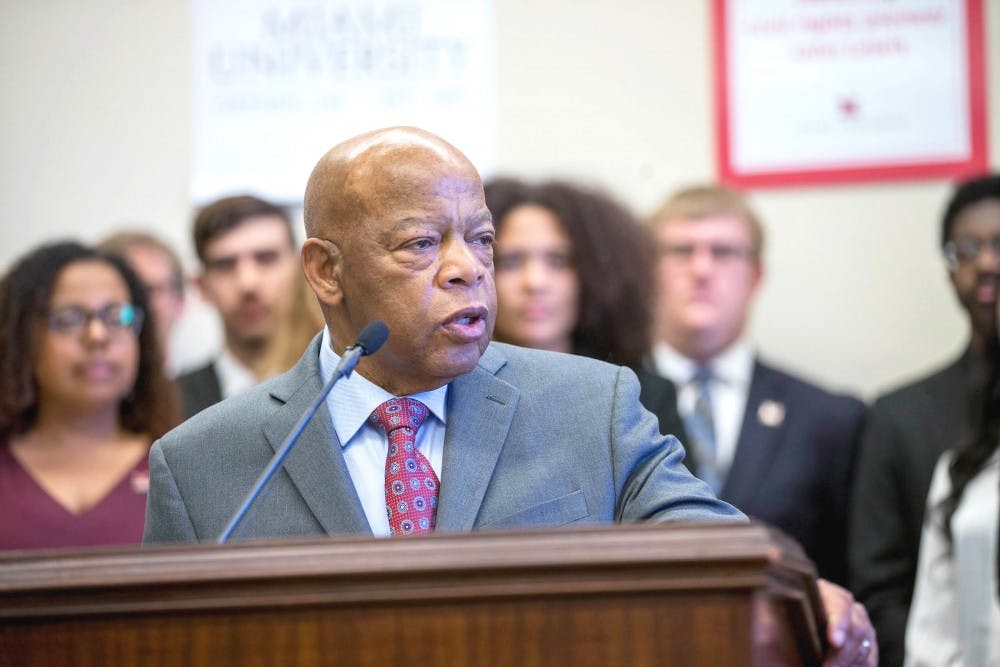WASHINGTON--Around 100 Miami students, alumni and administrators milled about in room 2203 of the Rayburn House Office Building last Monday, March 19. Chatter filled the space as camera crews stationed themselves in front of an empty podium. Suddenly, the room fell silent as all eyes turned to the door.
"I didn't think he'd actually show up," someone whispered among the crowd of students circled around the podium.
Legendary civil rights icon and United States congressman John Lewis entered the room silently. As he raised his eyes to meet the ranks of students, the room burst into applause.
People have not always been so appreciative of Lewis' work.
Throughout his tenure as a civil rights activist, Lewis was met with adversity. He was one of the original 13 Freedom Riders, and was arrested over 40 times for his involvement in civil rights marches and protests.
As the chairman of the Student Non-Violent Coordinating Committee (SNCC) from 1963-1966, Lewis helped organize the March on Washington and the 1964 Mississippi Freedom Summer voter registration campaign across the South.
He also helped lead the march from Selma to Montgomery on May 7, 1965, where he was beaten by Alabama state troopers and suffered a fractured skull. Lewis was elected to Congress in 1987, where he still serves as the Representative for Georgia's 5th district.
Eight-hundred of Lewis' fellow student activists trained for the 1964 Mississippi Freedom Summer on Miami's own former Western College for Women Campus.
Three of those students were murdered while registering voters.
The lives of James Chaney, Andrew Goodman and Michael Schwerner are commemorated by a stone monument residing on Western Campus.
With the toes of his signature cowboy boots tapping incessantly on the floor, university President Gregory Crawford stepped up to the podium to present Miami's first Freedom Summer of '64 award to Congressman Lewis,
"We are here today to celebrate our past and our commitment to the future," Crawford said. "[The students who trained at the Western College for Women] were young and idealistic, ready to put themselves in harm's way in order to fight the scourge of racism in the American South. One of those students was John Lewis...He knew the dangers ahead. And, from that day forward, he has never backed down from those challenges."
Enjoy what you're reading?
Signup for our newsletter
Lewis nodded his head slightly, standing to the side of the podium. Crawford's toe-tapping slowed as he went on to describe Lewis' embodiment of those students who graced Western College for Women's campus in the summer of 1964.
"Today we honor that determination to stand up, not to stand by, to elevate the lives of others by our words and actions no matter what the cost," Crawford said, welcoming Lewis to the podium and embracing him as photos were snapped around the room.
"I don't know what to say, other than thank you," Lewis said.
Eventually, Lewis described growing up in Troy, Alabama where he preached to the chickens in his backyard, some of whom listened "better than some of my friends in Congress," Lewis said with a smile.
"But Dr. King and Rosa Parks and others inspired me to get in trouble," Lewis said. "Good trouble. Necessary trouble. And I've been getting in trouble ever since.
"Amen," a few people in the crowd concurred.
Lewis called on young people and women, especially, to take the next generation forward.
"Students have always played a major role," Lewis said. "Without students being involved, the civil rights movement wouldn't have succeeded."
When young people are criticized for their involvement in protest, Lewis said he encourages them to persevere; for only they can initiate real change.
"Let's save a little piece of this real estate we call Earth. Leave it a little cleaner, a little greener, and little more peaceful for a generation yet unborn," he said. "That is our calling. That must be our mission."
brunnsj@miamioh.edu
@samantha_brunn




